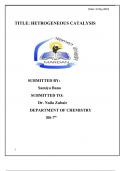Heterogeneous catalysis - Study guides, Class notes & Summaries
Looking for the best study guides, study notes and summaries about Heterogeneous catalysis? On this page you'll find 26 study documents about Heterogeneous catalysis.
Page 2 out of 26 results
Sort by

-
Homogeneous and heterogeneous catalysis notes
- Class notes • 8 pages • 2024
-
- $8.19
- + learn more
Explore the fascinating world of catalysis with our detailed guide on homogeneous and heterogeneous catalysis. Perfect for students, researchers, and professionals in chemistry, this document provides an in-depth analysis of these two pivotal types of catalysis, highlighting their principles, mechanisms, and applications. Contents: Introduction to Catalysis: *Definition and significance in chemical reactions Overview of catalytic processes and their importance . *Homogeneous Catalysis...
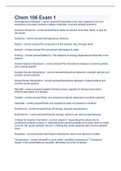
-
Chem 106 Exam 1 2023 with verified questions and answers
- Exam (elaborations) • 4 pages • 2023
-
- $8.99
- + learn more
Homogeneous Mixtures Composition may vary; appears to be one substance, but really contains multiple materials; most are actually solutions Aqueous Solutions Have water as solvent, and solid, liquid, or gas as the solute Solutions Homogeneous mixtures Solute The component of the solution that changes state Solvent The component that keeps its state Entropy (Delta S): The measure of energy dispersal and disorder in the system Solvent-Solute Intera...
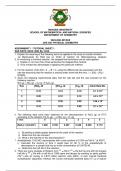
-
MUKUBA UNIVERSITY SCHOOL OF MATHEMATICAL AND NATURAL SCIENCES DEPARTMENT OF CHEMISTRY
- Exam (elaborations) • 6 pages • 2024
-
- $14.99
- + learn more
ASSIGNMENT 1 / TUTORIAL SHEET 1 DUE DATE: 08/05/ 2024 By 16:00. 1. Explain the meaning of the following terms as applied in the study of reaction kinetics (a) Molecularity (b) Rate law (c) Order of reaction (d) Heterogeneous catalysis 3. In monitoring a chemical reaction, the stopped-flow technique can be used applied. i) Explain in not more than three sentences the stopped-flow method. ii) Give at least two advantages of applying this particular method. 4. For the reaction of ...
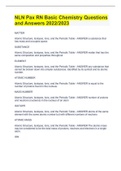
-
NLN Pax RN Basic Chemistry Questions and Answers 2022/2023
- Exam (elaborations) • 11 pages • 2022
-
- $10.39
- + learn more
MATTER Atomic Structure, Isotopes, Ions, and the Periodic Table - ANSWER a substance that has mass and occupies space. SUBSTANCE Atomic Structure, Isotopes, Ions, and the Periodic Table - ANSWER matter that has the same composition and properties throughout ELEMENT Atomic Structure, Isotopes, Ions, and the Periodic Table - ANSWER any substance that cannot be broken down into simpler substances. Identified by its symbol and its atomic number. ATOMIC NUMBER Atomic Structure, I...

-
class notes of chemistry
- Class notes • 23 pages • 2024
-
- $6.49
- + learn more
Surface Chemistry (JEE Advanced Level) Adsorption: Types of Adsorption: Physisorption and Chemisorption Adsorption Isotherms (Freundlich, Langmuir) Factors Affecting Adsorption Catalysis: Types of Catalysts: Homogeneous and Heterogeneous Enzyme Catalysis Characteristics of Catalysis Theories of Catalysis: Intermediate Compound Theory, Adsorption Theory Colloids: Types of Colloidal Systems Preparation of Colloids (Dispersion, Condensation) Properties of Colloids: Tyndall Effect...
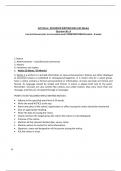
-
ORGANOMETTALIC CHEMISTRY
- Summary • 36 pages • 2024
-
- $9.59
- + learn more
1. Metal-Carbon Bonds: - Organometallic compounds feature direct metal-carbon bonds. - Common ligands include alkyls, aryls, and carbonyls. 2. Classification: - Organometallic compounds are classified based on the type of metal-carbon bond, such as sigma bonds (σ) or pi bonds (π). 3. Reactivity: - Organometallic compounds often exhibit unique reactivity compared to organic compounds. - They can undergo nucleophilic and electrophilic reactions. 4. Applications: ...
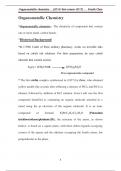
-
ORGANOMETTALICS CHEMISTRY
- Summary • 82 pages • 2024
-
- $7.99
- + learn more
Organometallic chemistry is a branch of chemistry that studies compounds containing metal-carbon bonds. These compounds often involve metals from groups 1 to 12 on the periodic table. Here's a brief overview of key aspects of organometallic chemistry: 1. Metal-Carbon Bonds: - Organometallic compounds feature direct metal-carbon bonds. - Common ligands include alkyls, aryls, and carbonyls. 2. Classification: - Organometallic compounds are classified based on the type of metal-c...
Heterogeneous catalysis is explained in detail

-
NSCI 6103A CHEMISTRY MIDTERM EXAM FIRST ATTEMPT | 2022 update 97% correct| Questions & Answers
- Exam (elaborations) • 9 pages • 2022
-
- $15.49
- + learn more
Home / My courses / UGRD-NSCI6103A-2013T / Week 8: Midterm Examination / Midterm Exam Question 1 Not yet answered Marked out of 1.00 Question 2 Not yet answered Marked out of 1.00 Question 3 Not yet answered Marked out of 1.00 Question 4 Not yet answered Marked out of 1.00 Question 5 Not yet answered Marked out of 1.00 Molecules in gases, under normal conditions, is observed to: Select one: a. Have no great interaction between them b. Exert great attractive forces to...

-
NSCI 6103A CHEMISTRY MIDTERM EXAM FIRST ATTEMPT | 2022 update 97% correct
- Exam (elaborations) • 9 pages • 2022
-
- $15.49
- + learn more
Home / My courses / UGRD-NSCI6103A-2013T / Week 8: Midterm Examination / Midterm Exam Question 1 Not yet answered Marked out of 1.00 Question 2 Not yet answered Marked out of 1.00 Question 3 Not yet answered Marked out of 1.00 Question 4 Not yet answered Marked out of 1.00 Question 5 Not yet answered Marked out of 1.00 Molecules in gases, under normal conditions, is observed to: Select one: a. Have no great interaction between them b. Exert great attractive forces to...

How much did you already spend on Stuvia? Imagine there are plenty more of you out there paying for study notes, but this time YOU are the seller. Ka-ching! Discover all about earning on Stuvia



